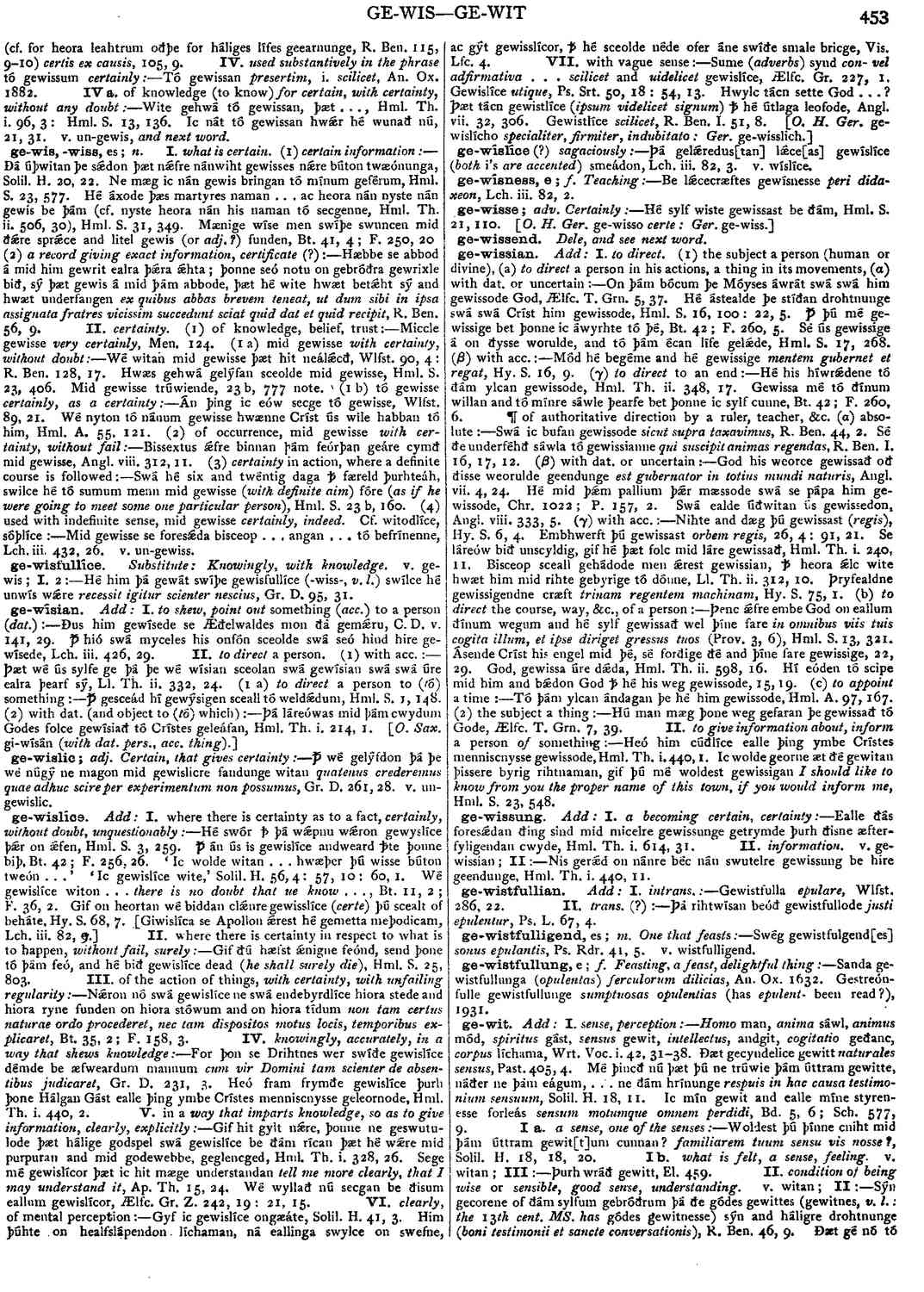ge-wit
-
Homo man, anima sáwl, animus mód, spiritus gást, sensus gewit, intellectus, andgit, cogitatio geðanc,
corpus
líchama,- Wrt. Voc. i. 42, 31-38.
-
Ðæt gecyndelice gewitt
naturales sensus,
- Past. 405, 4.
-
Mé þincð nú þæt þú ne trúwie þám úttram gewitte, náðer ne þám eágum, . . . ne ðám hrínunge
respuis in hac causa testimonium sensuum,
- Solil. H. 18, 11.
-
Ic mín gewit and ealle míne styrenesse forleás sensum motumque omnem perdidi, Bd. 5,
- 6; Sch. 577, 9. I a. a
what is felt, a sense, feeling.
v. witan;
-
Þurh wráð gewitt,
- El. 459.
-
Sýn gecorene of ðám sylfum gebróðrum þá ðe gódes gewittes (gewitnes,
v. l.: the 13th cent. MS. has gódes gewitnesse) sýn and háligre drohtnunge (boni testimonii et sancte conversationis ),
- R. Ben. 46, 9.
-
Ðæt gé nó tóhrædlíce ne sién ástyrede from gewitte
ut non cito moveamini a vestro sensu,
- Past. 213, 16.
-
Lǽran sceal mon geóngne monnan . . . sylle him wist and wǽdo oð þæt hine mon on gewitte álǽde,
- Gn. Ex. 48.
-
Ne séce ic nó hér þá béc, ac ꝥ ðæt þá béc forstent, ðæt is þín gewit (
tuae mentis sedem requiro
),- Bt. 5, 1; S. 11, 30.
-
Ǽlc wiste his gewit swá swá hé ǽr wiste; ꝥ gewit wæs swíþe sorgiende for þám ermþum ðe hí drógan
sola mens stabilis, super monstra, quae patitur, gemit,
- 38, 1; F. 196, 6.
-
Ic gehére þæt mín gewit is ǽce. Ac mé lyst gýt witan be ðám gewitte þæt ic ǽr ǽcsode (cf. hweðer ðú æfter ðæs líchaman gedále and þǽre sáwle máre wisse þonne ðú nú wást þe lǽsse,
- 59, 6),
-
Ic niéhst ácsode be mínum gewitte,
- 65, 4: 33, 17: 38, 7.
-
Ic þín gewit mid ealle ne forlét,
- Bt. 5, 3; F. 14, 8.
-
Þú man geworhtest, and him sealdest word and gewitt (
speech and reason
),- Hy. 9, 56.
-
Swelce snytro swylce manegum óþrum ieldran gewittum oftogen is,
- Bt. 8; F. 24, 28. (1 a) an intellectual faculty :--
familiarem tuum intellectu vis nosse,
- Solil. H. 18, 19.
-
Úre gesceádwísnes is betere þonne nýtena andgit sié, oððe þæs gewittes ǽnig dǽl ðe him forgifen is,
- Bt. 41, 5; F. 254, 13.
-
Gleáwhýdig Judas (him wæs weallende gewitt (-wilt,
- MS.) þurh witan snytro)
-
Nó hé on gewitte blon þæs þe hé ǽr ongann, þæt hé Dryhten herede,
- An. 1267.
- Hé on gewitte oncneów þæt . . ., 672: 770.
-
Wís on þínum gewitte,
- Hö. 78: Crä. 13: An. 470.
- On gewitte wác, 212.
- Wísan gewitte, 552.
-
Hé wédde on gewitte,
- Jul. 597.
- Onwend þec in gewitte, 144.
-
Þæt þæt gewit ne mæg mód onwendan monna ǽnig mid drýcræftum
nec potentia gramina corda vertere non valent,
- Met. 26, 100: An. 35.
-
Þurh wís gewit,
- Cri. 1193.
- Þurh fród gewit, 1178.
- Hí deorc gewit hæfdon on hreðre, 640.
- Þæt týddre gewitt, 29.
-
Gif hwylc man of his gewitte feóle
si homo quis mente sua excederit,
- Ll. Th. ii. 236, 29.
-
Gif mon of his gewitte weorðe,
- Lch. ii. 288, 20.
-
Ꝥ hé hæbbe his gewitt
that he have his wits about him,
- Ll. Th. ii. 352, 31.
-
Ne wénþ ðæs nán mon ðe his gewit hæfð
nisi qui insaniat, nemo id putat,
- Bt. 36, 7; F. 184, 3.
-
Ꝥ þú forlure þín gewitt,
- Hml. S. 36, 311.
-
Þæt þú gewittes ne wást bútan wildeóra þeáw,
- Dan. 572.
-
Þá yldu þurh gewittes wylm wendan tó lífe,
- Ph. 191.
-
Worde and gewitte, wíse þance,
- Gen. 1958.
-
Mid gewitte gemunan Meotudes láre,
- Cri. 1200.
-
Ic on þé sylfum oncnáwe wísdómes gewit,
- An. 645.
-
Hí náhton foreþances, wísdómes gewitt,
- El. 357: 1191.
-
Þonne gé ofsleáð hira untruman gewit
percutientes conscientiam eorum infirmam,
- Past. 451, 36.
- v. ferþ-gewitt,ferhþ-gewitt, riht-gewitt, un-gewitt, unriht-gewitt.
Bosworth, Joseph. “ge-wit.” In An Anglo-Saxon Dictionary Online, edited by Thomas Northcote Toller, Christ Sean, and Ondřej Tichy. Prague: Faculty of Arts, Charles University, 2014. https://bosworthtoller.com/50533.
Checked: 0